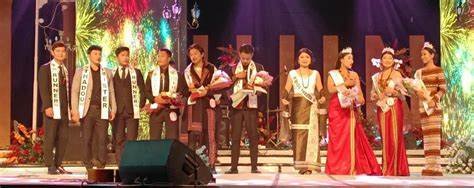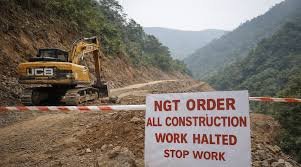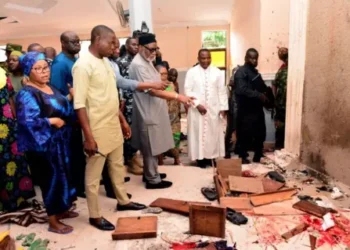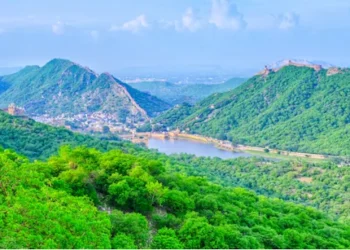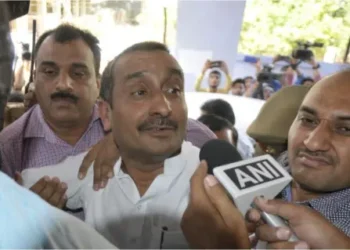Despite its limited following, TIM’s push for a “Peace Day” supports its claim to promote peace and unity in Manipur, which has been under President’s Rule since February 13, 2025, after Chief Minister N. Biren Singh stepped down.
BY PC Bureau
As Manipur approaches the second anniversary of the ethnic violence that erupted on May 3, 2023, the Thadou Inpi Manipur (TIM), the apex body of the Thadou tribe, has issued a heartfelt appeal to transform the day into a unifying “Peace Day” rather than a platform for ethnic provocation. The proposal, detailed in a media release dated May 1, 2025, comes at a critical juncture for the state, which has been grappling with deep-seated ethnic divisions and the aftermath of violence that has claimed over 250 lives and displaced tens of thousands since the conflict began.
TIM, despite its limited following among the Thadou clan, has positioned itself as a voice for reconciliation, urging all communities in Manipur to collectively observe May 3 as a day of reflection and peace-building.
“Thadou Inpi Manipur (TIM), apex body of the Thadou community, would like to appeal and propose to all the people of Manipur to collectively observe May 3 as ‘Peace Day’ in Manipur every year instead of different communities observing it separately in an antagonistic communal fashion to suit some communal politics and divisive agenda that are detrimental to confidence building, community understanding, reconciliation and peace,” the statement read. The organization emphasized the importance of honoring “the memory of those who have fallen victim to the tragic violence in Manipur” while extending empathy to survivors and their families.
ALSO READ: As Divides Deepen, Manipur Seeks Answers to May 3 Tragedy Two Years On
The appeal draws inspiration from Japan’s annual Hiroshima commemoration, with TIM suggesting that Manipur reflect on the violence that has scarred the state. “Last year, the Thadou Students Association, on behalf of the Thadou community, appealed to observe the day as ‘Peace Day’ drawing inspiration from Japan’s commemoration of the Hiroshima bombing to call for international peace and denounce war and violence,” the release noted. It further urged introspection, asking communities to consider “what we are making of the violence in our own state, which affects our community and society.”
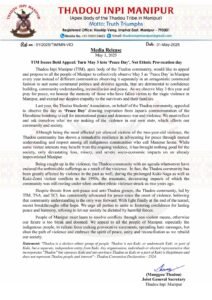
Manipur has been a cauldron of ethnic tensions, particularly between the Meitei, Kuki-Zomi, and other indigenous communities, since May 2023. The Thadou, often historically grouped under the Kuki-Zo umbrella, have faced their own challenges, including what TIM describes as “the unthinkable sufferings” endured during past conflicts like the Kuki-Naga clashes in the 1990s and the more recent Kuki-Zomi violence. “Although being the most affected yet silenced victims of the two-year-old violence, the Thadou community has shown a remarkable resilience in advocating for mutual understanding and respect among all indigenous communities who call Manipur home,” the statement highlighted.
ALSO READ: For Peace Talks, Arrest COCOMI Cadres First: Kuki Inpi
TIM has been vocal about its distinct identity, distancing itself from the Kuki nomenclature. The media release reiterated this stance, quoting the Thadou Convention Declaration of 2024: “Thadou is a distinct ethnic group of people. Thadou is not Kuki, or under Kuki, or part of Kuki, but a separate, independent entity from Kuki. Any organisation, individuals or elected representative that incorporates ‘Thadou’ but espouses Kuki and mis-portrays Thadou as Kuki or a part of Kuki is illegitimate and does not represent Thadou people and interest.”
This assertion underscores the organization’s broader push for recognition as a separate entity, a position that has sparked divisions within the Thadou community itself, with some aligning with the Kuki identity and others advocating for collaboration with the Meitei for peace.
Signed by Manggou Thadou, Joint General Secretary of Thadou Inpi Manipur, the effectiveness of TIM’s proposal remains uncertain, given its limited influence and the deep ethnic faultlines that continue to divide Manipur. As the state marks two years since the violence began, the hope for a unified “Peace Day” reflects a broader yearning for reconciliation, but the road ahead remains complex and challenging.


